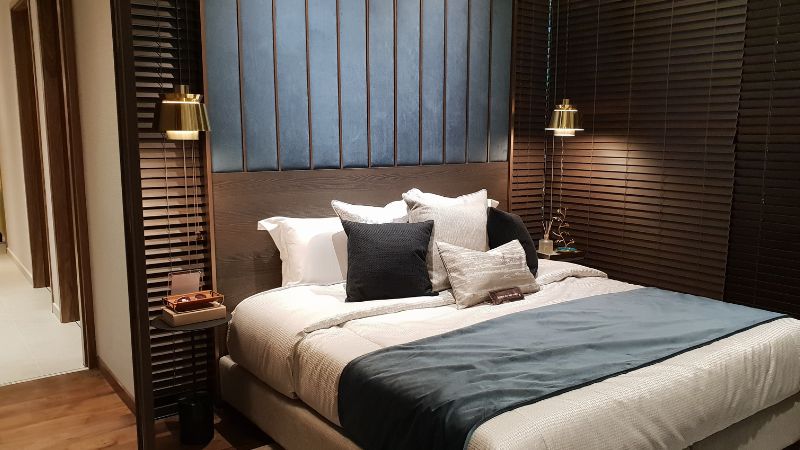Can You Buy a Hotel Room Permanently? (& How Much Does it Cost)

As participants in Amazon Associates and other programs, we earn from qualifying purchases. This comes at no additional cost to you. For more details, see our Affiliate Disclosure.
The idea of owning a piece of a hotel is an alluring prospect for many people, particularly those who frequently travel or love the idea of owning a vacation home without maintenance. However, the question on many people’s minds is whether it’s possible to buy a hotel room permanently and what the cost of doing so might be.
Buying a hotel room permanently may seem like a great way to invest your money and have a place to call your own whenever you want to travel. However, there are many factors to consider before making such a decision, including the legality of such a purchase, the cost involved, and the potential benefits and drawbacks of owning a hotel room. This article will explore these topics and provide a comprehensive guide to help you decide if buying a hotel room is your choice.
Understanding the Concept of Permanent Hotel Room Ownership
Permanent hotel room ownership is purchasing a hotel room and having full ownership rights for an extended period, usually for life. It’s important to note that buying a hotel room doesn’t mean owning a physical room within a building; rather, you own a share of the hotel’s revenue, profits, or expenses.
As a permanent hotel room owner, you’ll have the right to use the hotel room for a set number of days each year, and you’ll receive a share of the hotel’s profits based on the number of days you use the room.
This ownership model is a form of fractional ownership, a popular trend in the real estate industry. Fractional ownership allows people to own a property, such as a vacation home or luxury yacht, for a fraction of the cost of owning the entire property outright.
The idea behind fractional ownership is that the cost of owning and maintaining a property is split among several owners, which makes it more affordable for individual buyers. Similarly, permanent hotel room ownership allows you to have a stake in the hotel industry without investing in an entire hotel.
Is Buying a Hotel Room Legal and What are the Legalities Involved?
The legality of buying a hotel room varies from country to country and even from state to state. In many places, permanent hotel room ownership is legally recognized and a valid way to invest in the hotel industry. However, there are also locations where this practice is not legal, and permanently owning a hotel room can be complicated.
Before considering purchasing a hotel room, it’s important to research the local laws and regulations to ensure that you’re investing in a legitimate opportunity.
In addition to local laws and regulations, legalities are involved in the buyer’s and hotel purchase contracts. For example, the contract should specify the number of days the buyer is entitled to use the hotel room each year, the terms and conditions of the use of the room, the rights and responsibilities of the owner, and any fees or costs associated with ownership.
The contract should also outline the terms for selling or transferring the hotel room if the owner wants to sell or pass ownership to someone else. It’s essential to carefully review the contract and consult a lawyer before signing to ensure the terms are fair and legally binding.
Pros and Cons of Owning a Hotel Room Permanently
Permanent hotel room ownership may seem like a lucrative investment opportunity for those who frequently travel or want to own a vacation property. However, it’s important to carefully consider the pros and cons of this investment before making a decision. In this section, we will explore the benefits and drawbacks of permanently owning a hotel room to help you determine if it’s the right investment opportunity.
Pros:
- A share in hotel revenue and profits can provide a potential return on investment.
- The convenience of having a pre-paid vacation home managed and maintained by the hotel staff.
- The possibility of a more luxurious travel experience, with access to amenities that may not be available to regular hotel guests.
- The ability to generate income by renting out your hotel room when you’re not using it.
Cons:
- Limited usage of the hotel room, as you will only have access to it for a certain number of days each year.
- The risk of the hotel going out of business or not performing well can negatively impact the return on investment.
- Potential maintenance fees can be costly and vary based on the hotel’s performance.
- The difficulty of selling the hotel room, as there may not be a significant demand for this type of investment.
How Much Does it Cost to Buy a Hotel Room Permanently?
The cost of buying a hotel room permanently varies widely depending on the location, the size and quality of the room, the hotel’s popularity and reputation, and the terms of the ownership agreement.
Buying a hotel room is a significant investment, and the cost can range from tens of thousands to millions of dollars, depending on these factors. Some hotels may offer financing options to make the investment more affordable, but it’s important to consider the long-term costs and potential returns before purchasing.
Buying a hotel room may include additional fees such as maintenance fees, management fees, and other costs associated with the upkeep and management of the hotel. These fees can vary widely depending on the hotel’s performance, and they should be factored into the overall cost of ownership.
It’s important to carefully review the ownership agreement and consult with a financial advisor before purchasing to ensure that the investment is a sound financial decision.
Financing Options for Purchasing a Hotel Room
Purchasing a hotel room permanently can be a significant investment, and it may not be feasible for everyone to pay the cost upfront. Fortunately, several financing options are available to make this investment more affordable. This section will explore some common financing options for purchasing a hotel room and their advantages and disadvantages.
Personal Loans: Personal loans are a common option for financing a hotel room purchase. These loans can be obtained from banks or other financial institutions and are typically unsecured, meaning the borrower doesn’t need to provide collateral. Personal loans have fixed interest rates and repayment terms, which can help borrowers budget and plan for the payments. However, personal loans may have higher interest rates than other financing options and require a good credit score.
Home Equity Loans: Home equity loans are another option for financing a hotel room purchase. These loans allow borrowers to use the equity in their home as collateral to secure a loan. Home equity loans typically have lower interest rates than personal loans, but they also require the borrower to have equity in their home. Home equity loans also put the borrower’s home at risk if they cannot make the payments.
Fractional Ownership: Fractional ownership is a form of co-ownership where multiple investors share the ownership of a hotel room. This can be a more affordable option, as the cost of ownership is split among several investors. Fractional ownership also allows for more flexibility, as investors can use the hotel room several days yearly. However, fractional ownership may come with restrictions on usage, and investors may have limited control over the management of the hotel.
Developer Financing: Some developers may offer financing options for purchasing a hotel room, which can be convenient for buyers. Developer financing may offer more flexible terms than traditional loans, and it may be easier to qualify for. However, developer financing may come with higher interest rates and fees, and the developer may require a larger down payment than other financing options.
Factors to Consider When Choosing a Hotel Room to Buy
Choosing a hotel room to buy permanently can be exciting and challenging. There are several factors to consider before making a purchase, including location, hotel reputation, the size and quality of the room, and the terms of the ownership agreement. In this section, we will explore some of the key factors to consider when choosing a hotel room to buy permanently.
- Location: The hotel’s location is one of the most critical factors. The hotel should be located in a desirable area that is convenient for travel, has attractive surroundings, and is safe and secure. The location of the hotel can also impact the potential return on investment.
- Hotel Reputation: The hotel’s reputation is an essential factor to consider. The hotel should have a good reputation for service, amenities, and cleanliness. A hotel with a good reputation can attract more customers and may have a higher return on investment.
- Room Quality: The quality of the hotel room is another important factor to consider. The room should be spacious, clean, and comfortable, with high-quality amenities and furnishings. The room’s quality can impact the room’s demand and the potential return on investment.
- Ownership Agreement: The ownership agreement is critical when purchasing a hotel room. The agreement should outline the terms of ownership, including the number of days the owner is entitled to use the room each year, the fees associated with ownership, and the conditions for selling or transferring ownership.
- Hotel Management: The management of the hotel is an important factor to consider. The hotel should have a professional and experienced management team that is dedicated to maintaining the hotel’s reputation and profitability. The hotel management team can impact the hotel’s performance and the potential return on investment.
What Are Your Rights and Responsibilities as a Permanent Hotel Room Owner?
As a permanent hotel room owner, you have certain rights and responsibilities that come with ownership. Understanding these rights and responsibilities before purchasing is important to ensure you make an informed decision. In this section, we will explore the rights and responsibilities of a permanent hotel room owner.
Rights:
- The right to use the hotel room for a set number of days yearly.
- The right to a share of the hotel’s revenue, profits, or expenses is based on the number of days the room is used.
- The right to sell or transfer ownership of the hotel room, according to the terms of the ownership agreement.
- The right to receive regular reports on the hotel’s performance and financial status.
Responsibilities:
- The responsibility to pay maintenance fees and other costs associated with the ownership of the hotel room.
- The responsibility is to follow the terms of the ownership agreement, including the number of days the room can be used each year and any restrictions on usage.
- The responsibility is to maintain the hotel room in good condition and to follow the hotel’s rules and regulations.
- The responsibility to comply with local laws and regulations related to the ownership of a hotel room.
Alternatives to Buying a Hotel Room Permanently
While buying a hotel room permanently can be a desirable investment for some, it’s not the only option for those looking to invest in the hospitality industry. There are several alternatives to buying a hotel room that may be more flexible or affordable, depending on your needs and goals. In this section, we will explore alternatives to permanently buying a hotel room.
Timeshares
Timeshares are a popular alternative to permanent hotel room ownership. A timeshare allows you to own a portion of a property for several days each year. Timeshares can be more affordable than buying a hotel room outright and offer more flexibility in terms of usage. However, timeshares can come with restrictions on usage and may be difficult to sell or transfer ownership.
Vacation Rentals
Vacation rentals like Airbnb or VRBO are another alternative to permanent hotel room ownership. Vacation rentals allow you to rent a property for a short period, typically a few days or weeks. Vacation rentals can be more affordable than staying in a hotel and offer more flexibility in location and amenities. However, vacation rentals can come with risks, such as unreliable hosts or properties that don’t meet expectations.
Real Estate Investment Trusts (REITs)
Real Estate Investment Trusts (REITs) allow investors to buy shares in a portfolio of hotels or other real estate properties. REITs offer a diversified investment portfolio and can be more affordable than buying a hotel room outright. However, REITs can come with management fees and other costs, and investors may have limited control over the management of the properties.
Hotel Investment Funds
Hotel investment funds allow investors to pool their money to invest in a hotel or a portfolio of hotels. Hotel investment funds can offer a diversified investment portfolio and be more affordable than buying a hotel room outright. However, hotel investment funds can come with management fees and other costs, and investors may have limited control over the management of the hotel or portfolio.
Case Studies: Real-World Examples of Hotel Room Ownership
Real-world examples of hotel room ownership can help provide insight into the benefits and challenges of investing in a hotel room. In this section, we will explore a few case studies of hotel room ownership to illustrate some of the advantages and disadvantages of this type of investment.
The St. Regis New York
The St. Regis New York luxury hotel offers permanent ownership opportunities. The hotel rooms are owned by individuals or corporations and are managed by the hotel staff. The owners have the right to use the room for a set number of days each year, and they receive a share of the hotel’s revenue and profits. However, the owners also pay significant maintenance fees, which can be expensive.
The Ritz-Carlton Club, Aspen Highlands
The Ritz-Carlton Club, Aspen Highlands, is a timeshare property that allows owners to use a hotel room for a set number of days each year. The owners pay an initial purchase price and annual maintenance fees, and they can exchange their ownership for stays at other Ritz-Carlton properties worldwide. However, timeshare ownership can come with restrictions on usage and may be difficult to sell or transfer.
The Four Seasons Private Residences, Orlando
The Four Seasons Private Residences, Orlando, offers permanent ownership opportunities for luxury hotel rooms. The owners can use the room for several days each year and receive a share of the hotel’s revenue and profits. The owners also have the option to rent out the room when they’re not using it, which can generate additional income. However, the cost of ownership can be expensive, and the owners may have limited control over the management of the hotel.
Marriott Vacation Club
Marriott Vacation Club is a timeshare program that allows owners to use a hotel room for a set number of days each year. The owners pay an initial purchase price and annual maintenance fees, and they can exchange their ownership for stays at other Marriott properties worldwide. However, timeshare ownership can come with restrictions on usage and may be difficult to sell or transfer.
Is Buying a Hotel Room Permanently Right for You?
Deciding whether or not to buy a hotel room permanently is a complex decision that requires careful consideration of several factors. As we’ve explored in this article, this type of investment has several benefits and drawbacks, and it’s important to weigh these factors before making a purchase. Buying a hotel room permanently will depend on your needs, goals, and financial situation.
If you frequently travel and are looking for a convenient vacation home, a hotel room purchase may be an attractive option. It can provide you with a pre-paid vacation home managed and maintained by the hotel staff and may offer a more luxurious travel experience. Additionally, the potential for a return on investment and the ability to generate income by renting out the room can make a hotel room purchase a financially sound decision.
However, it’s essential to carefully consider the potential drawbacks of hotel room ownership, such as limited usage, maintenance fees, and the risk of the hotel going out of business. Additionally, the cost of ownership can be high, and financing options may come with higher interest rates and fees. It’s crucial to review the ownership agreement carefully and consult with a financial advisor before purchasing to ensure the investment is sound for your financial goals and needs.






